Home » Jazz Articles » Interview » Meet Duane Eubanks
Meet Duane Eubanks
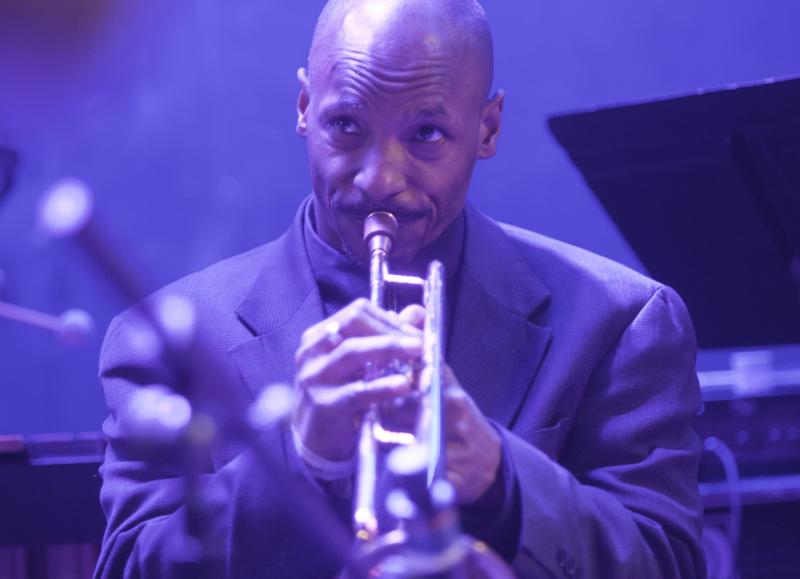
I found that there's much higher demand for jazz there (Europe). I find that to be a shame because I hate to travel that far to be appreciated. That's been the plight of the jazz musician for years.
In fact, the Eubanks family's immersion in music began with Duane's maternal grandmother, who passed on the tradition to Duane's mother, Vera, and to Duane's uncles, Ray and
Tommy Bryant
b.1930
Kenny Barron
pianob.1943
Born on January 24, 1969 in Philadelphia, Duane Eubanks is gradually gaining attention, especially in Europe, for the inspiring work of his own group. In addition, his bright tone and fluid technique in groups like his brother Robin's,

Mulgrew Miller
piano1955 - 2013

Mingus Big Band
band / ensemble / orchestraAs he tours more frequently throughout the Midwestern and Western parts of the United States, bringing his music to new audiences, Duane Eubanks will become even better known to the larger listening public. In this interview, he talks about his career to date.
All About Jazz: The reception of European audiences to your music has been gratifying, hasn't it?
Duane Eubanks: It was really strange. I went over there with

Illinois Jacquet
saxophone, tenor1922 - 2004
AAJ: Did you get to hang out with some of the people in the audience?
DE: Yes, they were really nice. They took us out to dinner. Getting close to the audience is very important in music. When the audience gets into your music that much, it gives you a reason to keep going on. We went to Germany, Austria, Switzerland and Denmark.
AAJ: Who was in your group?
DE:

Orrin Evans
pianob.1975

Ralph Peterson
drums1962 - 2021

Reid Anderson
bassb.1970

Dwayne Burno
bass1970 - 2013

JD Allen
saxophone, tenorb.1972

Cindy Blackman Santana
drumsb.1959
AAJ: Does your group play mostly in New York and Philadelphia?
DE: Mostly. We'll see what happens when the next recording comes out. The album is already out in Europe. It's called Second Take.
AAJ: Have you been in other groups too?
DE: I worked with the

Mingus Big Band
band / ensemble / orchestra
Mulgrew Miller
piano1955 - 2013
AAJ: Isn't he on the West Coast?
DE: No, he lives in upstate Pennsylvania now. I've been very grateful for working with someone of his caliber. He doesn't even have a record deal. That's a crime. Mulgrew works all the time, but he hasn't had a lot of opportunities to work with his own band. I don't understand the record labels. Not recording someone like Mulgrew isn't helping the music. The music should be first. If the labels followed that approach, everything would fall into place. The labels sign up young guys and try to get them to play like old guys. They should hire the older musicians and let them play the music right. I don't get it. It's hard to pinpoint exactly what the answer should be. I know the labels have their formulas.
AAJ: How has Mulgrew helped you?
DE: Oh man, he has opened me up to the music so much. And his level of musicianship is very high. Mulgrew is so musically astute, and he's such a nice cat. He doesn't have a cocky attitude, and he's a great person just to get to know. He can hear everything that's going on, and there's no way to bullshit in music. So he may tell you something that you're doing wrong. He may ask, "What are you playing over those chords?" And if I say, "I don't really know what to play" he'll sit down with me and ask me to try different approaches. Being surrounded by his talent rubs off to some extent. I've talked to a lot of musicians, and they all speak very highly of Mulgrew's musicianship. He has played in my Wings band with

Steve Wilson
saxophoneb.1961

Karriem Riggins
drumsb.1975

Richie Goods
bass
Steve Nelson
vibraphoneb.1954

Steve Nelson
vibraphoneb.1954
AAJ: Have you performed with

Uri Caine
pianob.1956
DE: Yeah. I played with him at Ortlieb's in Philadelphia a couple of times, and I sat in with him in Spain. He's a monster pianist. He had a couple of bands there, but

Steve Wilson
saxophoneb.1961

Drew Gress
bassb.1959

Ralph Peterson
drums1962 - 2021
AAJ: When did you move to New York?
DE: I'll be here five years in December. I still feel like a baby here. I'm still meeting people and trying to get around.
AAJ: Did Robin help you when you moved?
DE: Both he and Kevin did. After I finished college. I got a degree in business from the University of Maryland, and then I studied music at Temple University. I was there for a year, and I wanted to stay there for another year so that I could get some more things together. Robin and Kevin sat me down and said that I might as well get it together in New York. I had to face up to my fears.

Orrin Evans
pianob.1975
AAJ: You had studied business?
DE: Yes. At the time I started college, I didn't want to play music. I had stopped playing music throughout high school. I transferred to the University of Maryland with my twin. Shane was a music major, and he was in the band there. Then he talked me into joining the band. After I started playing again, I realized that I really missed the music. I thought, "I should be working on music instead," and I put aside the business studies. When I told my parents about my decision, they said, "Are you kidding? We have all of this money invested in you. You can't stop now." I told them, " I don't want to study business any more. I just want to play music." But I completed my requirements for a business administration degree, but at the same time, I started getting serious about music. The music director was
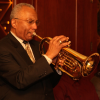
John Lamkin
trumpet
Donald Harrison
saxophone, altob.1960
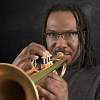
Darren Barrett
trumpetb.1967
AAJ: And then you went to Temple.
DE: Yes, I was trying to grasp the basics that I was never really exposed to. I taught myself chords and how to transcribe solos. I wasn't learning much in school, but I was in a musical environment. That's exactly what I needed. As I said, I wanted to stay another year to learn more theory and harmony. But Robin and Kevin talked me into moving here.
AAJ: What did your parents think of you going back to music school?
DE: Well, they didn't pay for it. [Laughs] Once they saw how serious I was about music, they accepted it. Since I paid for it myself, earning the money was a learning experience in itself as I approached my dreams.
AAJ: What do your parents think of having a famous musical family?
DE: They'e very very proud of all of our accomplishments. Even if all of us brothers had been truck drivers, we would have been very blessed to be a part of a two-parent household. That's not very prevalent any more. Our parents showed us love, and they showed us right from wrong. Also, they led by example to prove what is possible from hard work. We had good role models.
AAJ: What kind of work did your father do?
DE: He was on the Philadelphia police force for a number of years. But he left that job because blacks weren't being promoted at the time. So he got a job in corporate security at AT&T, where he was promoted. He retired from AT&T. He loves the slow blues, and I bought him a harmonica for Christmas. Also, he loves the Jimi Hendrix blues that Robin did on his CD, Get 2 It. Whenever Dad comes to one of my gigs, I make sure that I do one of those gutbucket blues tunes.
AAJ: You mother is a musician?
DE: Oh, yes. She's a very fine, accomplished pianist. Mostly, she plays gospel and classical music. I always hear her practicing concertos and things like that when I go home. Ray Bryant, her brother, raves about my mother's playing. At the moment, my mother plays for churches around town. You wouldn't find her in a jazz club.
AAJ: And Shane is your twin. Did you play in school?
DE: I played trumpet and Shane played trombone. We started playing music in sixth grade. I stopped playing in ninth grade. Shane moved on to a performing arts school. He continued to play and majored in music. I lost interest.
AAJ: What was it like for Shane to be another trombone player in the same family?
DE: Hearing Robin blew our minds. Shane and I grew up together, and we never heard a trombone played the way Robin does it—that fast and that cleanly articulated. It's amazing.
AAJ: What is Shane doing now?
DE: Our paths have switched. Shane was teaching music at a high school in Maryland for four or five years, and he grew tired of it. He didn't like being that far away from home. So, he moved back to Philadelphia. Now, he's an assistant manager at Home Depot. He has had a couple promotions, and so he has stayed there. To teach in Pennsylvania, he would have had to be re-certified since his teaching certificate is from Maryland.
AAJ: How long have you been playing in Robin's group?
DE: I've been playing with my brother Robin as part of Mental Images for two years now. Robin has led Mental Images longer than that though; he recorded it on JMT in 1994. We just started to get some gigs. We recently led a master class and concert in Omaha, and we were on tour in May. We worked at Yoshi's in California and ended up in New York. It's really strange: I've been to Europe four or five times, but I had never been as far west as Chicago until now. The release of his CD, Get 2 It, has helped us line up the gigs. That's really not a straight-ahead jazz CD. That kind of music isn't Robin 's preference. I think he sound best when he plays in odd meters. His music has opened my ears as a musician immensely.
AAJ: How did you join Mental Images?
DE: I think Robin had a little gig, and he thought he would give me a chance. I got through it, and I guess he decided to keep me in the group.
AAJ: Had you played in unconventional meters before you worked with Robin?
DE: No, I hadn't. I was playing basically straight-ahead. I'm getting used to the different meters. At first, it was difficult to keep time.
AAJ: Did Robin's music require a lot of practice?
DE: It did. It was a matter of conquering something new. That's how I approached it.
AAJ: Well, the music comes together well.
DE: Gene [Jackson] and Lonnie [Plaxico] have been playing with Robin for at least twenty years. Gene was in Kevin's band when Robin used to play with Kevin. They all have a connection that a band leader needs.
AAJ: Did the whole family perform at the Mellon Festival in 1999 when Kevin and Robin were honored?
DE: Yes. I was fortunate enough to sit in. The Mellon Festival was a good situation for the entire family to perform together. We did a tribute to my dad. That was a very rewarding experience because I don't get to play with Kevin at all. I've sent him some of my CD's, and I hear him when he comes to town. I don't get to see him very often. He comes home for holidays, but otherwise we don't get to interact as much as we would like. I love his level of musicianship. Robin and Kevin are at a level that makes it possible for younger players to be exposed to the music. The Young Lions scene was part of their generation. Wynton, Branford,

Bobby Watson
saxophone, altob.1953

Bill Pierce
saxophone, tenorb.1948

Javon Jackson
saxophoneb.1965
AAJ: And all of that music started with

Art Blakey
drums1919 - 1990

Terence Blanchard
trumpetb.1962

Benny Green
pianob.1963

Geoffrey Keezer
keyboardsb.1970
DE: That's exactly right. I met Art once when Robin was in the band. I never got to play in his band, or anything like that. He was really funny.
AAJ: What are your plans for the future?
DE: I'm just trying to hone my skills. Maybe some opportunities will occur when the second release comes out in the States. I want to work with Mulgrew a lot more. I've been working with

Jason Lindner
keyboards
Dave Holland
bassb.1946

Chris Potter
saxophone, tenorb.1971

Steve Nelson
vibraphoneb.1954

Antonio Hart
band / ensemble / orchestrab.1968

Mark Gross
trumpet and vocalsb.1966

Gary Smulyan
saxophone, baritoneb.1956

Josh Roseman
trombone
Alex Sipiagin
trumpetb.1967
AAJ: Robin seems to be as modest as you are.
DE: He continues to work on his music. Robin gives me something to strive for. To see him continuously working on his craft keeps me inspired.
Tags
Duane Eubanks
Interview
AAJ Staff
United States
Tommy Bryant
Philadelphia
Kenny Barron
Mulgrew Miller
Mingus Big Band
Illinois Jacquet
Orrin Evans
Ralph Peterson
Reid Anderson
Dwayne Burno
J.D. Allen
Cindy Blackman
Steve Wilson
Karriem Riggins
Richie Goods
Steve Nelson
Uri Caine
Drew Gress
John Lamkin
Donald Harrison
Darren Barrett
Bobby Watson
Bill Pierce
Javon Jackson
Art Blakey
Terence Blanchard
Benny Green
Geoffrey Keezer
Jason Lindner
Dave Holland
Chris Potter
Antonio Hart
Mark Gross
Gary Smulyan
Josh Roseman
Earl Gardner
Alex Sipiagin
Comments
PREVIOUS / NEXT
Support All About Jazz
 All About Jazz has been a pillar of jazz since 1995, championing it as an art form and, more importantly, supporting the musicians who make it. Our enduring commitment has made "AAJ" one of the most culturally important websites of its kind, read by hundreds of thousands of fans, musicians and industry figures every month.
All About Jazz has been a pillar of jazz since 1995, championing it as an art form and, more importantly, supporting the musicians who make it. Our enduring commitment has made "AAJ" one of the most culturally important websites of its kind, read by hundreds of thousands of fans, musicians and industry figures every month.



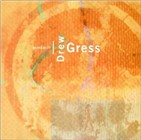
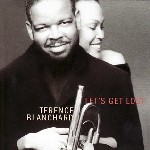



 Buy Now
Buy Now





















